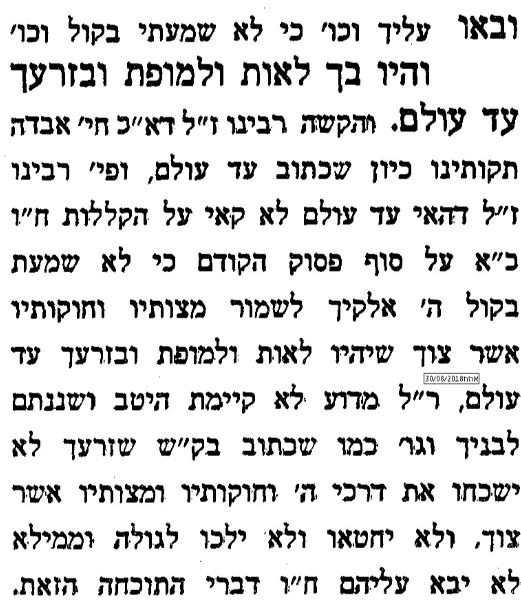I heard someone mention that the Maharal Diskin say the following explanation on this posuk: וּבָאוּוּבָאוּ עָלֶיךָ כָּל־הַקְּלָלוֹת הָאֵלֶּה וּרְדָפוּךָ וְהִשִּׂיגוּךָ כָּל־הַקְּלָלוֹת הָאֵלֶּה וּרְדָפוּךָ וְהִשִּׂיגוּךָ עַד הִשָּֽׁמְדָךְ כִּי־לֹא שָׁמַעְתָּ בְּקוֹל הִשָּֽׁמְדָךְ כִּי־לֹא שָׁמַעְתָּ בְּקוֹל ה' אֱלֹקֶיךָ לִשְׁמֹר לִשְׁמֹר מִצְוֹתָיו וְחֻקֹּתָיו אֲשֶׁר צִוָּֽךְ וְחֻקֹּתָיו אֲשֶׁר צִוָּֽךְ: וְהָיוּ וְהָיוּ בְךָ לְאוֹת וּלְמוֹפֵת וּֽבְזַֽרְעֲךָ עַד־עוֹלָֽם לְאוֹת וּלְמוֹפֵת וּֽבְזַֽרְעֲךָ עַד־עוֹלָֽם:
"All these curses will come upon you, until you are destroyed, because you will not have listened to the voice of Hashem, your G-d, to observe His commandments and His decrees that He commanded you. They will be in you as a sign and as a wonder and in your offspring, forever..."
Now at first glance that posuk seems like a terrible curse, “They will be in you as a sign and as a wonder and in your offspring, forever...” In effect, we are doomed, G-d forbid. However, the Maharal Diskin says that that’s not the way to read the posuk. The words ad olam is not going, G-d forbid, on the curses that would infer that these curses will be with us forever. But those words ad olam are referring to the previous posuk
In simple english, “Because you didn’t do mitzvos in a way that made a lasting impression on your children!”
Why is that? The Maharal Diskin says that this is the next posuk, “Because you did not serve Hashem, your G-d, with gladness and with goodness of heart..."
Does anyone know where Maharal Diskin's insight can be found?

